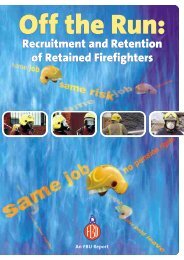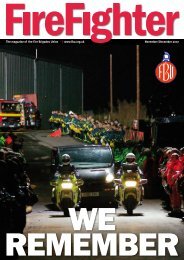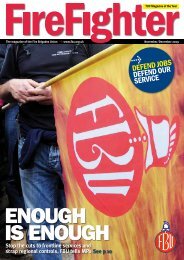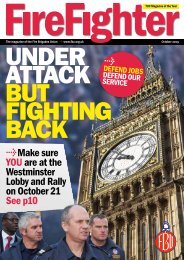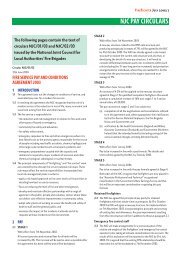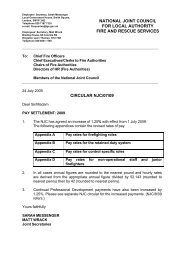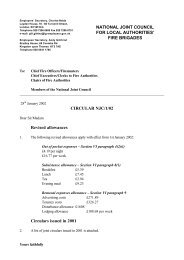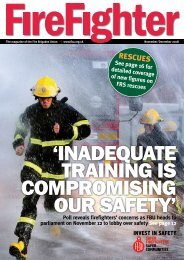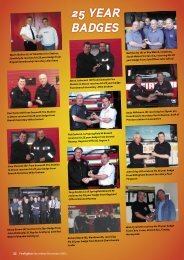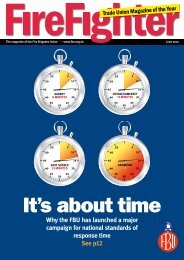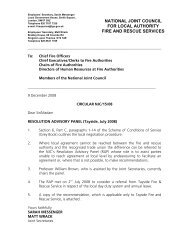Firefighter July 2010 - Fbu.me.uk
Firefighter July 2010 - Fbu.me.uk
Firefighter July 2010 - Fbu.me.uk
- No tags were found...
Create successful ePaper yourself
Turn your PDF publications into a flip-book with our unique Google optimized e-Paper software.
Trade Union Magazine of the YearThe magazine of the Fire Brigades Union > www.fbu.org.<strong>uk</strong> <strong>July</strong> <strong>2010</strong>How vulnerable are youand your family? p10LESSONSOF THESOUTHYORKSHIREDISPUTESee p14CHIEFOFFICERS’PAYHow much isyours getting?See p16
The ‘bloated’ public sectorThe new govern<strong>me</strong>nt hasbeen very clear since theelection that it intendsto make huge cuts topublic expenditure. Weare told the public sectoris “bloated” and inefficient whereas,supposedly, the private sector is “lean”,efficient and wealth creating.It seems logical on one level – wehave huge public debts so we need tocut back. It’s just the sa<strong>me</strong> as running ahousehold budget isn’t it?But nothing is ever thatstraightforward. When we look a bitcloser we begin to see what it <strong>me</strong>ansin reality.The value of public servicesThe public sector <strong>me</strong>ans the schools ourchildren attend and the hospitals we goto when we are sick. The public sector<strong>me</strong>ans the support given to our elderlypeople when they are unable to look afterthemselves and need additional care.The public sector <strong>me</strong>ans the socialworkers who try to protect childrenvulnerable to violence and abuse.The public sector <strong>me</strong>ans the peoplewho clean our streets and take awayour do<strong>me</strong>stic refuse. Of course you can“save” money by reducing collectionsfrom once a week to every fortnight – butthen nobody wants stinking rubbishfestering in the bins for rats to growfat on.Of course there is waste. Toomuch public money has gone toprivate consultants who have co<strong>me</strong>into our public services and advisedhow to “improve” them – often withdisastrous results.Too much money has gone to boostthe salaries of those at the very top –while the rest of us are told to tightenFeaturesContents10 CUTS: WE’RE EXPECTED TO PAYGovern<strong>me</strong>nt launches the most vicious attackon public services in living <strong>me</strong>mory14 LESSONS FROM SOUTH YORKSHIREHow hard work by FBU <strong>me</strong>mbers and officialswas rewarded in last year’s strike16 MIND THE GAPFrontline firefighters and control staff are facing paycuts, but the salaries of chief officers are soaringRegulars4 NEWSFire station for sale; FBU learning goes from strengthto strength; London <strong>me</strong>mbers warn of sum<strong>me</strong>r ofstrife; employers delay response on pay5 SOUNDING OFFHelp union keep “unisex” kit database up to date7 NEWS FOCUSMaking the FBU case to MPs8 VIEW FROM THE AERIAL LADDER PLATFORMHealth and safety at chemical fires18 HEALTHThe case for a maximum temperature in workplaces19 LEGAL BEAGLENervous about giving evidence in court; capability reviews20 DAY OFFMeet Adrian Clarke, FBU region 9 secretary andcoach of a girls’ under-14 football team22 PUZZLE PAGEYour chance to win £50 worth of iTunes downloads23 STATION CATThe news they don’t want you to hear24 25-YEAR BADGESANNA GOWTHORPE/PA PHOTOS20Day Off: TrainingNethertonUnited Diamondsunder‐14s14Lessonsfrom SouthYorkshire2 FireFighter <strong>July</strong> <strong>2010</strong>
10The nightmarevision facingus for the nextfive yearsour belts. And too much money has goneon ill thought out projects – such ascontrol regionalisation.No ‘golden age’ in the fire serviceIn the fire and rescue service, there hasbeen no golden age of huge invest<strong>me</strong>nt.We have fewer firefighters than we hadten years ago. The cuts we have alreadyseen have been targeted precisely at theso-called “frontline” – and we can expectmore of the sa<strong>me</strong>. There has been noprotection of “frontline” services in fireand rescue – so why should we expectany different anywhere else?The agenda is very clear – it is to slashsignificantly public services and this willimpact on the lives of all of us and on thetype of society we live in.Who caused the crisis?Two years ago there was huge anger atthe role the banks had played in sparkinga global economic catastrophe. NorthernRock … Lehman Brothers … Royal Bankof Scotland … Goldman Sachs … Sir FredGoodwin … re<strong>me</strong>mber them?Well, apparently we all now needto forget them because the peoplewho really caused the world economicdisaster are those who clean your localhospital or serve school dinners toyour kids or look after your mum in hercare ho<strong>me</strong>.Just to state this highlights whatnonsense it is. And it is a nonsensewhich needs to be exposed. Thebanks were bailed out by more than£850 billion of our money. Yet alreadybonuses are back and the wealthiestin society are doing fine. The SundayTi<strong>me</strong>s Rich List recently revealed thatthe 1,000 richest people in the countryincreased their wealth by £77 billionlast year, bringing their total wealth to£335 billion — equal to more than onethird of the national debt. While weare told to tighten our belts and acceptthe “inevitable” cuts, the wealth of thewealthiest has grown by 30% during theworst period of recession!We are in for a tough ti<strong>me</strong>. We willneed to stand together to defend ourjobs, our services and our pensions.And next ti<strong>me</strong> you hear DavidCa<strong>me</strong>ron saying: “We’re all in thistogether” … well, decide for yourself.Matt WrackIn <strong>me</strong>mory ofAlan KynochThroughout Friday 18 June, FBU <strong>me</strong>mbersin Grampian began to learn of Brother AlanKynoch’s tragic passing earlier that day.Alan had been preparing to go off dutywhen he suddenly collapsed on station.Along with his close comrades at our Elginbranch, the im<strong>me</strong>diate thoughts of FBU<strong>me</strong>mbers throughout our brigade and regiongo out to his wife Anne and his family.This tragic news co<strong>me</strong>s at a ti<strong>me</strong> whenAlan and Anne were beginning to makeplans due to the short period of ti<strong>me</strong> he hadleft to serve.Alan Kynoch was 53 when he died andhad given 27 years of service. He worked inStrathclyde and joined Grampian fire andrescue service in 1993.Especially because Alan was one of ourown, we will make every effort to provide thenecessary support for Anne.Alan PatersonFBU Grampian brigade secretaryPHILIP WOLMUTH/REPORTDIGITAL.CO.UK■■Published by the Fire Brigades Union,Bradley House, 68 Coombe Road,Kingston upon Tha<strong>me</strong>s KT2 7AEwww.fbu.org.<strong>uk</strong>■■Design by Edition Periodicals,241 Ferndale Road,London SW9 8BJwww.editionperiodicals.co.<strong>uk</strong>■■Printed bySouthernprint Ltd,17–21 Factory Road,Poole, Dorset BH16 5SN<strong>July</strong> <strong>2010</strong> FireFighter 3
News<strong>July</strong> <strong>2010</strong>> Latest news> Sounding off> In briefDes res: firestation, onecareful ownerHERTSTo the estate agent, it’s just anotherdesirable property. “Prominent mainroad frontage, suitable for a varietyof uses, Radlett town centre and mainlinerailway station both within 200m,” says theagent’s brochure.There’s just one problem. Thisproperty is the only fire station in Radlett,Hertfordshire. The station was closedin 2006 as part of a council cost-cuttingexercise, even though it attended 300 calls ayear. Now it’s up for sale.Tony Smith, FBU Hertfordshire secretary,said: “We believe that it is morally unjustifiablethat Hertfordshire county councilshould now look to profit from the sale ofsuch a valuable historic a<strong>me</strong>nity in whichso much community funding and effort hasbeen invested.“The people of Radlett are looking totheir politicians to start fulfilling theirelection promises. This building is andalways has been a community asset andthat’s how it should remain.”A campaign group, SOFAR (Save our fireand rescue) is demanding either the reinstate<strong>me</strong>ntof the fire station or that the site is usedfor a community safety centre, incorporatingfire, police and ambulance services.The group, supported by the FireBrigades Union, accuses Hertfordshirecounty council of bad faith. The councilhad agreed that if the community wantedto keep its fire station, it would have to payfor it. The funding was secured from thecommunity by the action group, but thepoliticians reneged on the deal and put thestation up for sale.Carolynne Brown, chair of thecampaign, said: “SOFAR is totally opposedto the proposed sale of the land. We believethat the building and land should be retainedfor community use and we will continue tocampaign against a change of use of the site,or any planning application.”SAVE OUR LOCAL FIRE STATIONPlans to sell a landmark fire station inBrighton have been shelved becauseofficials cannot find anywhere to builda replace<strong>me</strong>nt.<strong>Firefighter</strong>s and campaigners (left)have been fighting to save PrestonCircus fire station, after East Sussexfire and rescue service revealed itwanted to sell the building last year.Steve Liszka, FBU rep for PrestonCircus, said: “This supports our viewthat East Sussex fire authority cannotfind a site better than Preston Circusand it is highly unlikely they will findanother site as good as this one.”He added: “We are opposed tothe move. We think Preston Circusis perfectly equipped to cope withBrighton’s needs.”Despite announcing that it willdelay the sell-off for at least a yearbecause it cannot find a suitable sitefor a new station, the fire authorityhas vowed to push on with the project.The campaign to defend PrestonCircus will continue.4 FireFighter <strong>July</strong> <strong>2010</strong>
Bob Fitz-Gerald,FBU ULF regionalco-ordinator, and LornaTaylor, the FBU ULFskills for life advisor(centre), receive theULF national awardfrom Lenny Henry(right) and for<strong>me</strong>rminister Pat McFaddenFBU union learning goesfrom strength to strengthEDUCATIONThe FBU’s involve<strong>me</strong>nt in the UnionLearning Fund (ULF) has gone fromstrength to strength, with awards andsuccessful bids this year.The union succeeded with applicationsmade at the end of 2009 and the beginningof <strong>2010</strong>. New funding will go to England(£1.1 million), Scotland (£45,000) andNorthern Ireland (£15,000). Wales has afurther year of funding before a new applicationis to be submitted.Trevor Shanahan, FBU national ULFproject manager, said: “It is six years sincethe Fire Brigades Union successfully appliedfor national funding from the UnionLearning Fund to invest in raising andengaging <strong>me</strong>mbers and employees of the fireand rescue service in lifelong learning.”The project has <strong>me</strong>ant the develop<strong>me</strong>ntof a new union official role to the workplaceLONDONThe Fire Brigades Union is calling onthe commissioner of the Londonfire brigade to head off a sum<strong>me</strong>r ofindustrial strife by facing down authoritymanagers and politicians who stand accusedof stoking the fla<strong>me</strong>s of conflict.Industrial relations in the brigade havesoured following attempts by councillorBrian Coleman and his militant colleaguesin the London Fire and E<strong>me</strong>rgency PlanningAuthority to force through a number ofunwelco<strong>me</strong> <strong>me</strong>asures. <strong>Firefighter</strong>s acrossLondon are angry at moves to introducechanges to shift patterns and other conditionsof service in the face of overwhelmingworkforce opposition.FBU London regional organiser BenSprung said: “When the 12-hour shiftproposals were first announced, the FBUran a consultative ballot, overseen by anindependent scrutineer, which asked– the union learning representative (ULR).He added: “We have trained close on 500ULRs across the UK fire and rescue serviceover the last six years and now, with the FBUunion learning policy looking to embedlifelong learning the new project seeks tore-invigorate and engage all ULRs.”The project has delivered 17,000 coursesand 3,000 new qualifications with over20,000 FRS employees already having hadso<strong>me</strong> involve<strong>me</strong>nt in learning opportunities.Shanahan said: “The ULF project hashad a profound impact on lifelong learningwithin the UK fire and rescue service.FBU <strong>me</strong>mbers and fire and rescue serviceemployees continue to show their willingnessand readiness to engage in learning, refreshtheir learning and develop new skills.”> > Further information can be obtainedby contacting Trevor Shanahan, attrevor.shanahan@fbu.org.<strong>uk</strong> or 01670 534685.‘Change culture to avoid conflict’<strong>me</strong>mbers whether they wanted a new shiftsystem or whether they were happy with thepresent one. A staggering 98% of <strong>me</strong>mbersvoted against the proposals for a new shiftsystem. Despite this very clear response,the brigade has continued as if nothinghappened. They completely ignored the veryclear wishes of their own workforce andcarried on regardless.”The mood of dissatisfaction is likelyto result in an official ballot for industrialaction, after a series of branch <strong>me</strong>etingsacross the capital revealed the true extent ofthe bitterness felt by firefighters.“But,” said Sprung, “it is still within the giftof authority managers to prevent an industrialbattle if they wish to do so. What it wouldtake, though, is a complete culture change inthe way they approach industrial relationswith the FBU, and it would <strong>me</strong>an that thatsmall band of hardline, militant politicians,who seem to be doing so much damage to ourservice must be tackled head-on.”Sounding off!KEVIN HERNIMANSouth West FBU regional officialHelp keep our ‘unisex’kit data up to dateThe FBU and its personal protectiveequip<strong>me</strong>nt sub-committee have beenworking to get information from fire andrescue services about PPE. It is staggeringthat many fire and rescue services have notsigned up to Firebuy for a variety of reasons,one being they did not like the colour choices.Now so<strong>me</strong> fire and rescue services areinsisting that ‘unisex’ firefighters existbecause they are issuing ‘unisex’ PPE. Why?Because it is a cheaper option. But if fire andrescue services are honest, it is male kit witha ‘unisex’ label sewn in.PPE was tested on the manikins Ralph(Research Aim Longer Protection againstHeat) and Sophie (System ObjectiveThe female test manikin Sophie wearing male-fitkit is exposed to 20% more burnsProtection against Heat In an E<strong>me</strong>rgency). Itwas found that Sophie wearing male-fit kitis exposed to 20% more burns than if she iswearing female-fit PPE. Based on the resultsof the tests carried out so far it appearsthat significant differences in burn injury dooccur between male and female manikinswearing the sa<strong>me</strong> design of clothing. Thistype of manikin fire testing is an optionalrequire<strong>me</strong>nt of EN 469 and of EN ISO 11612(revision of EN 531) – the European standardscovering firefighters’ protective clothing.If our female firefighters are wearingunisex kit, they are exposed to more danger.And the law states that all PPE must be fittedcorrectly to ALL firefighters.Our <strong>me</strong>mbers are still suffering “reddening”injuries whilst training in controlled conditions,although their PPE is up to EN 469 standard.Surely our <strong>me</strong>mbers must be afforded the bestpossible protection whilst they are putting theirlives on the line every day and to save themfrom catastrophic injuries?I am collecting information on which fireand rescue services are issuing “unisex” firekit. Please help us to keep our database upto date.> > Contact: kevin.herniman@fbu.org.<strong>uk</strong> or0117 9355132.DAVID BURROWS<strong>July</strong> <strong>2010</strong> FireFighter 5
NEWSBrigade’ssnap reviewof servicesESSEXThe Fire Brigades Union<strong>me</strong>t Essex fire servicemanagers last month afterthe sudden announce<strong>me</strong>nt of arapid but exhaustive review ofoffice and frontline services.The announce<strong>me</strong>nt ca<strong>me</strong> theday before the FBU was due to<strong>me</strong>et senior managers to discussfinal proposals for a potentialcompromise settle<strong>me</strong>nt to theongoing dispute over last year’scuts in firefighters and frontline999 services.Keith Flynn, Essex FBUsecretary, said: “Industrialrelations have begun to improveand we look forward to reachinga negotiated settle<strong>me</strong>nt to thecurrent dispute in the very nearfuture and hope that this can leadto a more cooperative approachin dealing with the reviewannounced by the service today.”Wake up ands<strong>me</strong>ll the coffeeAccording to LibDem treasuryminister Danny Alexander,£6,000 has been spent on coffeemachines for each new regionalcontrol centre. FBU generalsecretary Matt Wrack said: “Thisis small beer compared to thehuge overall cost of the regionalcontrol centres and to the £43million and rising that is beingspent on consultants’ fees for thisproject. Both Danny Alexander’sparty and the Conservatives werepledged to stop the regionalcontrol centres. They should stopdithering, and do it.”FBU Member BenefitsHo<strong>me</strong>, Motor andTravel Insurance0845 8428421(Calls charged at local rate)www.fbuinsurance.co.<strong>uk</strong>First minister promisesto try to protect pensionsPENSIONSAlex Salmond, firstminister of Scotland,has promised to protectfirefighters’ pensions, aftervisiting a fire station at therequest of the FBU.Gordon McQuade, FBUbrigade secretary for CentralScotland, said: “I asked the firstminister if he would co<strong>me</strong> alongto one of the Central Scotlandstations to discuss issues relatingto the Scottish Fire Service.“Alex Salmond ca<strong>me</strong> alongto our Alloa station and hediscussed issues on the fireservice with the firefighters. Hegave a pledge to try and protectthe firefighters’ pensions, ashe sees these as a right that wesigned up to and not so<strong>me</strong>thingthat should be taken away.”Alex Salmond, first minister of Scotland, local SNP Westminster parlia<strong>me</strong>nt candidate Annabelle Ewing and MSPKeith Brown with FBU officials and firefighters at Alloa fire station in central ScotlandEmployersdelay on payPAYEmployers have delayed their response to the FBU’spay claim, citing fears about govern<strong>me</strong>nt cuts.The delay was revealed at last month’s <strong>me</strong>etingof the National Joint Council (NJC).The FBU submitted a claim for a rise in all NJC payrates equal to the increase in the retail price index (RPI)of June of this year which was 5.1%.FBU general secretary Matt Wrack said: “We havemade clear to the employers that we do not acceptthat fire service pay should be sacrificed as a resultof decisions made by the new govern<strong>me</strong>nt. We haveinsisted that the employers respond to the claim as earlyas possible.”He added: “Members will have noted the difficultieson pay faced by our colleagues in other public services.“It is clear that we face tough ti<strong>me</strong>s as the govern<strong>me</strong>ntand many employers attempt to use the economic crisisto make attacks on pay, on pensions and on other conditionsof service.“We made clear to the employers that firefighters andother public sector workers did not cause the economiccrisis and should not be made to pay the price for it.”The claim for <strong>2010</strong> was based on the view that FBU<strong>me</strong>mbers should not suffer real cuts in living standardsas a result of below-inflation pay rises.Big jump in tradeunionists killedGLOBAL UNIONSThere was a sharp increase in themurder of trade unionists in 2009.Around the world 101 were killed – anincrease of 30% over 2008. The internationaltrade union centre ITUC said 48 were killedin Colombia. Twenty-two of these weresenior union leaders and five were wo<strong>me</strong>n.Latin A<strong>me</strong>rica generally was a dangerousplace for trade unionists. Of the other tradeunionists killed, 16 were in Guatemala, 12 inHonduras, six in Mexico, four in Brazil andthree in the Dominican Republic.Despite the onslaught, unions remain thelargest voluntary organisations in the world.Luis Arguello, a firefighter and trade unionist inBogota, the capital of Colombia, where almostone trade unionist a week is murderedJESS HURD/REPORTDIGITAL.CO.UK6 FireFighter <strong>July</strong> <strong>2010</strong>
NEWS FOCUSPOLITICSThe FBU went to parlia<strong>me</strong>nt last monthto set out the union’s priorities for thenew govern<strong>me</strong>nt and to get our parlia<strong>me</strong>ntarygroup organisedFBU general secretary Matt Wrack spokeat the all-party parlia<strong>me</strong>ntary group on firesafety and rescue on 7 June. He told thepacked committee room that the FBU hasfive im<strong>me</strong>diate issues for the new govern<strong>me</strong>ntand the new parlia<strong>me</strong>nt.Priority number one was to scrapFiReControl. Wrack said: “We would expectthe new govern<strong>me</strong>nt to keep its promise,scrap the sche<strong>me</strong> and update existingcontrol rooms with new technology – as hasbeen done in Scotland.”The FBU also wants the law changed toaccount for firefighters’ role in respondingto flooding. <strong>Firefighter</strong>s responded magnificentlyto the 2007 floods, and this wasrecognised by the Pitt Review.Wrack said: “The new govern<strong>me</strong>ntshould impose a statutory duty on fire andrescue services to respond to flooding.”National standardsA third priority was national standards andguidance. Wrack told MPs about the drasticdecline in attendance ti<strong>me</strong> standards overthe last decade and the postcode lotteryof response under IRMP. He explainedthe FBU’s “It’s about ti<strong>me</strong>” campaign, fornational standards of fire cover – at least atthe level of the old system – preferably better.Wrack said: “The FBU wants authoritativenational guidance to improve ourservice and to protect firefighters.”A further priority is firefighter safety.Making theunion’scase to MPsFBU PARLIAMENTARY GROUPAlthough the FBU is not affiliated to anypolitical party, it does have to engage inpolitics. With a public sector employerand political decisions affecting the fireand rescue service, the union cannotignore politics.The union has written to all MPsabout its priorities for the fire andrescue service. The FBU’s parlia<strong>me</strong>ntarygroup of MPs has been reconstituted,with John McDonnell MP once again thesecretary. The union will be coordinatingits work with other independent unions,to ensure that firefighters and otherworkers’ voices are heard in parlia<strong>me</strong>nt.Wrack reminded MPs that a decade ago ithad beco<strong>me</strong> very rare for firefighters to bekilled on duty. However since “modernisation”,firefighter fatalities have escalated.Over the last five years 18 firefighters havedied while on duty in the UK; 14 of them atincidents. Ten firefighters have died whilefighting fires.The FBU believes this is because of thedowngrading of e<strong>me</strong>rgency intervention.The FBU wants lessons to be learned fromfatalities and tangible changes in resourcesand training to minimise the risk offirefighters dying in the line of duty.<strong>Firefighter</strong> jobsThe final point was to warn MPs not tocut the fire and rescue service. Fire andrescue service funding cuts <strong>me</strong>an one thing:firefighter jobs lost. And firefighter jobs lost<strong>me</strong>an greater risk to public and firefightersafety. <strong>Firefighter</strong>s still make thousands ofrescues every year. The range and diversityof e<strong>me</strong>rgency incidents firefighters areexpected to deal with has grown.Wrack said: “Our <strong>me</strong>ssage to the govern<strong>me</strong>ntis: If you’re considering cutting the fireand rescue service funding – think again.”DUNCAN PHILLIPS/REPORTDIGITAL.CO.UK<strong>July</strong> <strong>2010</strong> FireFighter 7
VIEW FROM THE AERIAL LADDER PLATFORM
Health andsafety matters atchemical firesFIRST DEPLOYMENT OFAIR QUALITY CELLSINCE BUNCEFIELDAround 100 firefighters successfullytackled a fire at Grosvenor Chemicalsin Linthwaite, near Huddersfield on 24May. At the height of the fire, 25 fireengines attended from West Yorkshireand neighbouring brigades.The fire was in a storage sectionand involved pesticides and gluebasedproducts. As a precaution,West Yorkshire fire and rescue service(WYFRS) advised <strong>me</strong>mbers of thepublic living nearby to stay indoors andto contact the NHS if they developedrespiratory problems.WYFRS said that, due to the hard workof firefighters, the fire was containedbefore it reached bulk chemical storagetanks and the majority of the run-off<strong>Firefighter</strong>s at GrosvenorChemicals in Linthwaitenear HuddersfieldANNA GOWTHORPE/PA PHOTOS<strong>Firefighter</strong>s are rightly worriedabout exposure to hazardoussubstances at fires – especiallythose at chemical plantswater was contained on the site.The main health concern ca<strong>me</strong> fromthe smoke plu<strong>me</strong>. For the first ti<strong>me</strong>,the air quality cell (AQC) – a national,multi-agency group of technical experts– was deployed. The AQC was set up tocoordinate air quality data in the wakeof the explosion at the Buncefield oilstorage depot in 2005.FBU conference this year again passeda resolution on exposure to toxins.<strong>Firefighter</strong>s are rightly worried aboutexposure to hazardous substances at fires– especially those at chemical plants.West Yorkshire FBU officials areseeking more information on theGrosvenor Chemicals fire. They areparticularly concerned about the ti<strong>me</strong>taken from the AQC being requestedby the incident commander to thedeploy<strong>me</strong>nt of the AQC, which couldnot attend the scene swiftly enough tocapture sufficient useful data.The union wants to seecomprehensive monitoring carried out atincidents like this, to protect the healthof firefighters and <strong>me</strong>mbers of the public.
CUTSWORKERSAND THEVULNERABLEEXPECTEDTO PAYGovern<strong>me</strong>nt launches the most viciousattack on public services in living <strong>me</strong>moryThe first big lie of the new coalition govern<strong>me</strong>nt isthat its savage cuts program<strong>me</strong> will be “fair”. It haseven given it a na<strong>me</strong>: “progressive cuts”. Last monthchancellor George Osborne announced that welfarebenefits, tax credits and public sector pensions weretop of his hit-list – part of £40bn in additional cuts in the nextfive years. This is in addition to £73bn of cuts already planned– the biggest slash and burn of public services in recent history.We do not yet know the full impact of cuts on the fire andrescue service. But we do know that cuts already announcedand others in the pipeline will have a horrific impact on theliving standards of firefighters and their families.A two-year pay freeze (really a pay cut when inflation istaken into account), a commission to attack public sectorpensions, together with higher taxes and fewer services wereall announced in the budget. The govern<strong>me</strong>nt says we are allin it together. But workers are expected to pay – while theThe govern<strong>me</strong>nt says we areall in it together. But workersare expected to pay while fatcats still live a life of luxury.govern<strong>me</strong>nt’s fat-cat friends still live a life of luxury. TheInstitute of Fiscal Studies estimates that the cuts will costthe average family £1,000 a year. Public sector workersare expected to bear the brunt of cuts, while the rich, whohardly use public services, are barely affected.As the new fire minister Bob Neill put it when heslipped up in the House of Commons on 10 June: “Thosein greatest need ultimately bear the burden of paying offthe debt which this country has been left.”Attacks on children’s servicesThe govern<strong>me</strong>nt says the budget deficit has to be reduced ifwe are not to leave our children with a huge legacy of debt.But children and other vulnerable people are among thefirst to be hit by the cuts.The TUC’s Cuts Watch shows that, despite govern<strong>me</strong>ntpromises about frontline services and fairness, the cuts arealready hitting those with the greatest need.For example, the coalition has decided to axe plans toprovide children from low-paid families with free school<strong>me</strong>als. This <strong>me</strong>asure would have extended the entitle<strong>me</strong>ntto about half a million working families from September thisyear, making a real difference to their children’s wellbeing.The Child Poverty Action Group’s Imran Hussain estimatesthat suspending this provision is equivalent to taking away £600a year from a family with two children – or at least a 1% inco<strong>me</strong>taxincrease for the families it was <strong>me</strong>ant to help. Other projects10 FireFighter <strong>July</strong> <strong>2010</strong>
PAUL BOX/REPORTDIGITAL.CO.UKJOHN BIRDSALL/PA PHOTOSJESS HURD/REPORTDIGITAL.CO.UKMay <strong>July</strong> <strong>2010</strong> FireFighter 11
CUTSscrapped, facing cuts and or under threat range from inexpensiveeducation program<strong>me</strong>s to large school building budgets.Free swimming for under 17s and over 60s – planned as anOlympic legacy – has been withdrawn. Charges will now bere-instated across the country to “save” £40 million. So<strong>me</strong> £5million is being cut from England’s Play Strategy – which aimsto improve children’s play facilities and build new adventureplaygrounds.Every Child a Reader, a program<strong>me</strong> to support childrenwith literacy and reading difficulties, faces £5 million of cuts –and its future is not certain. The extended schools program<strong>me</strong>,which provides 8am–6pm activities for children, allowingmore parents to balance work and care, may also be cut.To fund the expansion of so-called “academies”– whichwould further frag<strong>me</strong>nt schools as well as undermine thenational pay and conditions of teachers – the multi-millionpound refurbish<strong>me</strong>nt of hundreds of schools across the UKfaces the axe. So more crumbling schools with leaky roofs,damp walls and worn out carpets.So<strong>me</strong> of the poorest wo<strong>me</strong>n and children will lose up to£1,200 a year from changes announced in the budget. Cuts tothe Sure Start maternity grant and baby ele<strong>me</strong>nt to tax credits,the abolition of the health in pregnancy grant and the scrappingof the planned toddler tax credit will take over £1,000 ayear from the mouths of needy children.Benefits lostOther benefits for children will be cut. Child benefit, usuallypaid direct to mothers, is to be frozen for three years. Taxcredits are to be cut. Pay<strong>me</strong>nts will fall for a family gettingmore than £40,000 from next year. This will affect almost allfirefighters with children whose partner works.Benefits will rise by less than inflation because the chancellorbroke the link with retail prices. This all adds up to amiserable attack on the living standards of children and thosethey live with – especially those on low inco<strong>me</strong>s.Taxes upValue added tax (VAT) will go up to a massive 20% from 4January 2011. The increase will cost households an extra £500a year, according to economists.VAT is a regressive tax. That <strong>me</strong>ans that the poorer you are,the higher proportion of your inco<strong>me</strong> goes on VAT. This is theopposite of progressive taxes, where the more you earn, themore tax you pay. So an increase in VAT will hit the pooresthouseholds hardest. The gap between rich and poor willbeco<strong>me</strong> ever wider. The vulnerable and worst off will inevitablygo without basic necessities.The VAT increase will also hit jobs, slow the pace ofeconomic recovery and add to inflation.A nightmare futureWhat will the cuts <strong>me</strong>an? The Chartered Institute of Personneland Develop<strong>me</strong>nt – the UK’s professional body for HR managers– estimates that the cuts will <strong>me</strong>an 750,000 public sectorworkers thrown out of work. It estimates that unemploy<strong>me</strong>ntwill reach 3 million by 2012 and stay thereuntil at least 2015. It also says “there is little prospect ofreal wage growth” – rather “real wage cuts in the publicsector” throughout this period.John Hills, a professor at the London School ofEconomics, estimates that the poorest fifth of householdswill lose 10% of their inco<strong>me</strong> from the cuts –compared to 1.5% from the richest fifth.The budget stated that govern<strong>me</strong>nt depart<strong>me</strong>ntslike CLG should expect cuts of a whopping 25% overfour years – this can only <strong>me</strong>an firefighter jobs underthreat. The govern<strong>me</strong>nt’s spending review is due toend in October. A further round of cuts is expectedafter that.The nightmare vision for the next five years is fewerjobs, lower pay, fewer services and higher taxes.The govern<strong>me</strong>nt says that our whole way of life willbe affected for decades to co<strong>me</strong>. It is right – if it gets awaywith it. But this will only happen if unions do nothing.The govern<strong>me</strong>nt will only be able to do it if working classpeople let it get away with it.There is an alternativeWorkers did not cause the crisis, but are expected to payfor it. But there is another way. The perpetrators shouldbe made to pay. Those who are able to pay – the businesses,the banks, the filthy rich who have done well fordecades – they should pay the bill for this crisis.There’s plenty of money to pay for public services:● ● £123bn – the tax evaded or avoided by the rich● ● £97bn – saved by cancelling Trident● ● £18bn – restoring corporation tax to 1997 levels● ● £19bn – if the top rate of inco<strong>me</strong> tax was 60% (as it wasunder Thatcher)A 50% tax on all inco<strong>me</strong> above £100,000 would bringin £2.3bn. Abolishing the UK’s domicile rule (which allowsthe super-rich to avoid paying tax in the UK) would net£3bn. A “Robin Hood” tax on all foreign exchange dealingsin sterling would bring in £3.2bn. An empty property taxcould net £5bn.The job of the trade union move<strong>me</strong>nt is to stand up andresist the cuts. The cuts have started, but much worse is toco<strong>me</strong> unless unions act.That <strong>me</strong>ans convincing people at work that solidarityand collective action can make a difference. All over Europeworkers are refusing to accept the bill for the crisis. We havebeen warned.Now we need to defend our living standards.> > TUC Cuts Watchwww.touchstoneblog.org.<strong>uk</strong>/category/cuts-watch12 FireFighter <strong>July</strong> <strong>2010</strong>
The nightmare vision forthe next five years is fewerjobs, lower pay, fewerservices and higher taxesWHAT £40bn INADDITIONALCUTS WILL MEAN> > The cuts will cost theaverage family £1,000 a year> > Extra VAT = £500 a yearfor an average family> > Free school <strong>me</strong>alscut = £600 a year> > Pay freeze <strong>me</strong>ans a paycut after inflation> > The poorest hit hardestPHILIP WOLMUTH/REPORTDIGITAL.CO.UK<strong>July</strong> <strong>2010</strong> FireFighter 13
<strong>Firefighter</strong>s from across thecountry demonstrate their supportfor South Yorkshire colleaguesLessonsfrom theSouth YorkshiredisputeIan Murray, Region 4 executive council <strong>me</strong>mber, explainshow FBU <strong>me</strong>mbers organised in South Yorkshire last year14 FireFighter <strong>July</strong> <strong>2010</strong>
SOUTH YORKSHIREThe FBU trade dispute withSouth Yorkshire fire and rescueservice (SYFR) began in earnestin December 2008 when theauthority approved the introductionof 12-hour shifts for all operational station-basedshift staff.Over the following months officials tried tonegotiate a collective agree<strong>me</strong>nt and starteda campaign to resist the proposals that werevehe<strong>me</strong>ntly opposed by <strong>me</strong>mbers.Locally, aspects of the organisation wereweak. Not all stations had branch reps and thedivisional structure of the brigade committeewas not working. Brigade committees ingeneral were poorly attended and the fewofficials who did attend were being put underextre<strong>me</strong> pressure from manage<strong>me</strong>nt.After sham negotiations, the FBU was toldthat SYFR intended to impose the 12-hourshifts. The FBU responded to this threatby initiating a campaign and registeringa trade dispute with the fire authority. Thistrade dispute stated that unless the threatANNA GOWTHORPE/PA PHOTOSof imposition was withdrawn the FBUwould com<strong>me</strong>nce a ballot of their <strong>me</strong>mbersfor action short of strike. All wholeti<strong>me</strong>unifor<strong>me</strong>d employees up to the role of watchmanager were balloted. Staff working theretained duty system (RDS) and those abovethe role of watch manager were not includedas they were not directly affected by the imposition.SYFR im<strong>me</strong>diately withdrew its threatof imposition and requested that the matterbe referred to the National Joint Council’sresolution advisory panel.EscalationOn 29 June 2009 the FBU was infor<strong>me</strong>d thatSYFR intended to issue an HR1 form, givingadvance notice to 744 firefighters that theyplanned to use a dismissal and re-engage<strong>me</strong>ntprocess to get 12-hour shifts introduced. Inessence this <strong>me</strong>ant that only the staff thatagreed to the contractual changes would bere-engaged by SYFR.Despite SYFR trying to define this act as a“technicality” the trade dispute was lifted toa whole new level. The FBU had no optionbut to respond to this new threat from SYFRby balloting <strong>me</strong>mbers again, but this ti<strong>me</strong> fordiscontinuous strike action. The differencethis ti<strong>me</strong> was that this ballot would involveall FBU <strong>me</strong>mbers in SYFR to maximise itseffectiveness.In response to the escalation of events andfollowing a request from the region, FBU headoffice assigned national officer Sean Starbuckand FBU organiser Daniel Giblin to SouthYorkshire with a brief to assist the campaign.Local officials briefed them on the situationregarding <strong>me</strong>mbership engage<strong>me</strong>nt andrecognised that in order to secure a successfulballot outco<strong>me</strong>, a tre<strong>me</strong>ndous amount ofwork would be necessary.The FBU organiser im<strong>me</strong>diately set up amatrix system for South Yorkshire branches,colour coding them on a traffic light system.This included a system for separating thedifferent watches at the wholeti<strong>me</strong> stations,which gave officials an indicator of branchesor watches that had or had not been visitedbut, more importantly, indicated feedbackI have no doubt thatthe ideas, input,commit<strong>me</strong>nt andorganisational skillsof the FBU organiserproved invaluableThis hard work waswell rewarded whenthe ballot result wasannounced and over80% of <strong>me</strong>mbershad voted ‘Yesfrom the places that had been visited.The organiser identified that there wereareas that had been overlooked by the officialsin the first ballot. He indicated that the<strong>me</strong>mbers working the RDS would also bepivotal to any success that strike action wouldbring, as SYFR had taken it for granted thatthey would provide cover in the event of anystrike action. So a concentrated effort wasmade to speak to these <strong>me</strong>mbers.The FBU organiser, along with brigadeofficials, visited every RDS branch. This washugely successfully and resulted in five out ofsix RDS branches im<strong>me</strong>diately backing action.Subsequent efforts did result in <strong>me</strong>mbers atthe one remaining RDS branch (with very fewFBU <strong>me</strong>mbers due to a local internal disputemany years ago) backing action.The organiser program<strong>me</strong>d a series ofrecurring <strong>me</strong>etings that covered every branchand, where necessary watches, and allocatedthese according to the brigade officials’availability.The officials had a clear view on the attitudeof the <strong>me</strong>mbership and were confident thatthe ballot would produce a good result. Thishard work was well rewarded when theballot result was announced and over 80% of<strong>me</strong>mbers had voted “Yes”.The organising did not stop once the ballotwas finished. Branch <strong>me</strong>etings continued witha regular once-a-week campaign <strong>me</strong>eting,which grew in numbers from a handful at thestart to a large roomful on a regular basis. Thecampaign <strong>me</strong>eting was open to all <strong>me</strong>mbersbut the request was for at least one <strong>me</strong>mberfrom every branch, preferably one from everywatch, to attend. The organiser recordedcontact details from regular attendees andensured that every branch was represented.The majority were officially elected to makeup a reinvigorated brigade committee with anew branch structure.I have no doubt that the ideas, input,commit<strong>me</strong>nt and organisational skills of theFBU organiser proved invaluable in the SouthYorkshire dispute and helped to breathe lifeinto a sleeping giant that is now well on theway recovery.<strong>July</strong> <strong>2010</strong> FireFighter 15
PAYGAP<strong>Firefighter</strong>s’ pay has barely risen inrecent years. But chief fire officershave done very nicely, thank youMIND THE16 FireFighter <strong>July</strong> <strong>2010</strong>
CHIEF OFFICERS’ PAYAlmost every chief fire officer in theUK is paid more than £100,000 ayear, with pension and other benefitson top. That’s just one of thedamning findings from researchcarried out for the Fire Brigades Union bytrade union researchers from the LabourResearch Depart<strong>me</strong>nt (LRD).Chiefs’ payLRD asked every fire and rescue service in theUK for the gross pay of chief fire officers – thatis pay before inco<strong>me</strong> tax is paid, excludingemployers’ national insurance, employers’pension contributions, and other benefitssuch as car allowances. The results are set outin Tables 1 and 2.Table 1 is made up of over half (30) of thefire and rescue services in the UK, whichprovided the amount chief officers receivedin 2009 (usually 1 April).The highest earner was the London firecommissioner, with almost £200,000 a year insalary. But almost every other chief fire officerTable 1 Chief officers’ payFRS 2004 2009%increase2004–9London 144,549 199,473 38Avon 99,597 165,034 66Staffordshire 119,000 154,207 30Kent 120,947 152,411 26West Midlands 116,751 152,058 30Cheshire 112,475 149,156 33Hampshire 119,414 142,399 19Tyne and Wear 112,302 136,611 22Humberside 95,784 135,779 42Durham & Darlington 93,279 129,543 39Dorset 95,184 129,282 36Mid & West Wales 98,676 124,590 26Cornwall 88,559 121,200 37Lothian and Borders 99,210 121,092 22Warwickshire 84,831 120,054 42Northern Ireland 102,621 117,633 15Cumbria n/a 114,999Buckinghamshire 98,545 113,877 16Highland and Islands 95,491 113,901 19Grampian 95,679 110,774 16South Wales 87,192 110,150 26North Wales n/a 109,238Gloucestershire 102,739 106,852 1 4Norfolk n/a 105,276Central Scotland 92,610 104,199Fife 89,814 103,401 15Tayside 91,305 101,367 11Dumfries and Galloway 80,994 97,289 20Isle of Wight n/a 94,699Wiltshire n/a 80,000 1SourceFreedom of Information requests, Labour Research Depart<strong>me</strong>nt, 2009-<strong>2010</strong>1 part year onlyin the table gets over £100,000 a year.Although all 57 fire and rescue servicesresponded, not all provided the exact datarequired. Often they hid behind concerns of“privacy” – as if the pay of senior public sectorfigures should be a private matter, even whenthey are paid out of taxpayers’ money.Table 2 consists of a further 24 fire andrescue services, which provided the pay bandsfor their chiefs – the minimum and maximumthey were earning in 2009. The highest figurewas for Merseyside, with between £180,000and £189,999 for 2009. Again, the pay bandsrevealed that almost every chief received over£100,000 in salary.Pay over the last five yearsThe FBU asked LRD to obtain the figuresgoing back to 2003, to get so<strong>me</strong> sort of pictureof how pay has increased under so-called“modernisation”. The comparison is bestdone with those fire and rescue services whichprovided exact figures. These are also set outin Table 1. For the 25 chief officers for whichthis information could be obtained, their paywent up by an average of 27% over the fiveyears since 2004. This works out at 5.4% a year– around double the rate of inflation.So<strong>me</strong> chief officers received massiveincreases in pay. In Kent, the chief officer’spay increased by two-thirds (66%) injust five years, while in Humberside andin Warwickshire, it went up by 42%. Thesefigures would no doubt be justified as“com<strong>me</strong>nsurate with the job and the responsibilitiesthat the role involves”. But it seemsmore likely that chief officers have been paidmore in order to imple<strong>me</strong>nt the last govern<strong>me</strong>nt’smodernisation agenda – cutting firefightersjobs, closing fire stations, imposingIRMPs and other changes.The comparisons also contrast starkly withthe pay of ordinary firefighters. In 2009 thepay of a competent firefighter was £28,199. Fora watch manager (B) last year it was £30,994 asset out by the National Joint Council.This <strong>me</strong>ans that chief fire officers wereearning as much as six ti<strong>me</strong>s the pay of aregular firefighter, and at least three ti<strong>me</strong>s asmuch.The differences have also grown. Over thesa<strong>me</strong> period (2004-2009), both a competentfirefighter and a watch manager’s pay wentup by 12.8%, or 2.6% a year – not much morethan the rate of inflation. From the availablefigures, chiefs pay increased twice as fast asthat – further widening the gap between thosewho do the work and those that oversee it.No pay justiceThe rates of pay for chief fire officers are notquite as high as those found across other partsof the public sector. However the public sectoris increasingly infected with a culture of selfenrich<strong>me</strong>nt,in which astronomic rates of payTable 2 Chief officers’ pay bandsFRS, chief fireofficer pay bands2004 2009Merseyside 110,000-119,999 180,000-189,999Essex 110,000-119,000 160,000-169,999Nottinghamshire 120,000-129,999 160,000-169,999 2Cambridgeshire 100,000-109,999 150,000-159.999Cleveland 90,000-99,999 150,000-159,999Strathclyde 110,000-119,999 150,000-159,999GreaterManchester115,000-120,000 150,000-155,000West Yorkshire n/a 150,000-159,999 3South Yorkshire 120,000-124,999 145,000-149,999Lancashire 105,000-109,200 142,500East Sussex 100,000-109,999 140,000-149,999North Yorkshire 85,000-89,999 140,000-144,999Devon &So<strong>me</strong>rsetn/a 135,000-140,000Bedfordshire 90,000-99,999 130,000-139,999Leicestershire 95,000-100,000 130,000-135,000Oxfordshire n/a 120,000-130,000Hertfordshire 105,518 113,630-129,450Northamptonshire n/a 112,000-117,000Hereford &Worcestern/a 110,000-119,999West Sussex 88,002-105,000 108,999-133,221Royal Berkshire 85,100-102,100 104,600-127,840Northumberland n/a 102,500-112,500Surrey 85,671-100,788 97,638-115,425Lincolnshire 70,000-80,000 90,000-100,000SourceLabour Research Depart<strong>me</strong>nt, 2009-<strong>2010</strong>, using Freedom of Informationrequests and fire and rescue service accounts,2 includes expenses3 includes “taxable benefits”Of those not included in the tables, Suffolk only provided a pay band for brigademanagers of £80,000-£110,000; Derbyshire only provided a total for brigademanagers of £505.561, divided between five post holders for 2008/09; andShropshire only provided the figure of £322,197, divided between four brigademanagers for 2008/09.are given to run down the welfare state andopen the road to further privatisation, deregulationand casual labour. This is a culture thatmany chief fire officers have bought into. It isa culture that does much to undermine thegood na<strong>me</strong> of the fire and rescue service in theeyes of the public.<strong>Firefighter</strong>s and other public sector workerssuch as nurses, teachers and others who dosocially useful work will be told that a payfreeze is the best they can hope for in the yearsahead – and that most probably they will be infor a pay cut in real terms.This is a disgrace. <strong>Firefighter</strong>s and otherworkers did not cause the economic crisis.<strong>Firefighter</strong>s have been underpaid for generations,with politicians offering warm wordsinstead of the just reward for the vital workthat is done. Yet the current situation isdifferent: we are expected to pay for fixing thesystem we did not break. We have paid forthe bank bailout with our taxes; now we areexpected to pay again to balance the books.In anyone’s language that’s a double robbery.That is why it should be a scandal for publicservants like chief fire officers to receiveexorbitant salaries.May <strong>July</strong> <strong>2010</strong> FireFighter 17 11
YOUR WELFARE HEALTHSo<strong>me</strong> don’t like it hotWorkplace temperatureMany thousands of workers inindoor workplaces like offices,shops and factories face hightemperatures at work all yearround, but especially so in thesum<strong>me</strong>r. Fire stations and control roomsare no exception. At ti<strong>me</strong>s, working insideduring the hot weather is not healthy.If people get too hot, they risk dizziness,fainting or heat cramps. In very hot conditionsthe body’s blood temperature rises. Ifthe blood temperature rises above 39°C, thereis a risk of heat stroke or collapse. Deliriumor confusion can occur above 41°C. Bloodtemperatures at this level can prove fatal andeven if a worker does recover, they may havesuffered irreparable organ damage.Even at lower temperatures, heat leads toa loss of concentration and increased tiredness,which <strong>me</strong>ans that workers are morelikely to put themselves or others at risk.How we are affected by heat is also influencedby humidity and the physical nature ofthe work. Other factors influencing how heatwill affect so<strong>me</strong>body is their degree of fitness,age and <strong>me</strong>tabolism.SHUTTERSTOCKThe law at workThe Workplace (Health, Safety and Welfare)THE UNION VIEWUnions want a maximum temperaturelimit to serve as a point whereemployers must take action. The TUCis calling for a maximum workingtemperature of 30°C, or 27°C forthose doing strenuous work. A“trigger temperature” would forewarnemployers to prevent discomfort byintroducing <strong>me</strong>asures, such as buildingredesign, insulation and ventilationsystems. Workers, whose exposureto heat cannot be reduced, should beprovided with adequate breaks andoffered job rotation.Regulations 1992 state that: “Duringworking hours, the temperature in all workplacesinside buildings shall be reasonable.”The regulations also require employers toprovide “a sufficient number of thermo<strong>me</strong>ters”to enable workers to determine thetemperature.However the law treats cold temperaturesdifferently from hot temperatures.During cold weather, employers are legallyobliged to act when temperatures dropbelow minimum standards. An approvedcode of practice (ACOP) accompanying theregulations lays down a minimum workingtemperature of 16ºC. If the work involvessevere physical effort, 13ºC is acceptable.However, when it co<strong>me</strong>s to high temperaturesin indoor workplaces, there is no legalmaximum temperature. The ACOP <strong>me</strong>relysays that “all reasonable steps should betaken to achieve a reasonably comfortabletemperature”, such as providing air-coolingplant, shading windows and siting workstationsaway from radiant heat. But itsuggests no maximum limit.So<strong>me</strong> professional organisations doindicate the range of acceptable workingtemperatures for human beings. The WorldHealth Organisation states that, in temperateclimates such as Britain, the optimum indoortemperature is between 18ºC and 24ºC. TheChartered Institute of Building ServicesEngineers, whose <strong>me</strong>mbers design buildings,recom<strong>me</strong>nds that temperatures shouldnot exceed 27ºC.HSE guidanceThe Health and Safety Executive (HSE)booklet, Thermal comfort in the workplace:guidance for employers, suggests a rangeof 13ºC to 30ºC, but it emphasises that thismay not ensure thermal comfort whenother factors are taken into account. Thesefactors include ventilation, humidity, thework involved and the person undertakingthe work.Last year the HSE board refused to recom<strong>me</strong>nda<strong>me</strong>nding the law to impose an upperworkplace temperature limit despite strongtrade union argu<strong>me</strong>nts in favour of a limit.HSE commissioned research thatconcluded that “on balance, the workplacetemperature issue is not one thatjustifies active regulatory intervention”.Instead the study called for “improved jointworking between all parties to the issue –govern<strong>me</strong>nt, trade unions and employerrepresentatives”.Earlier this year unions circulated an HSEquestionnaire to help it gather evidence asto whether high temperatures at work are aproblem in particular sectors or across theboard. It hopes that the responses will alsoassist in identifying practical and effectivesteps that can be taken to tackle the issue.> > The union case for a legally enforceablemaximum temperature is set out at www.tuc.org.<strong>uk</strong>/extras/maxtemp2009.pdf18 FireFighter FBU Month FREE 2006 CONFIDENTIAL STRESS & SUPPORT HELPLINE 0800 783 4778
YOUR WELFARE YOU AND THE LAWNervousin courtQDoes so<strong>me</strong>one with apersonal injury claimagainst their employer oranother person always haveto go to court? I have beentold by the FBU’s lawyersthat I have a good claim,but I’m very nervous aboutgiving evidence in court.AVery few personal injuryclaims go to court.Court appearances increaselegal costs which are payableby the person responsible forthe injury or their insurer.If there is no disputeover who was at fault forthe accident that causedthe injury and no disputeabout the level and nature ofthe injuries sustained, then“the other side” – usuallythe defendant’s insurancecompany – would usuallyrather settle the claim out ofcourt to save on costs.That is not to say that theywill always do so quickly.Insurers tend to drag their heels.Even when there is littledispute, they may quibble overthings that result in the injuredperson’s solicitor having to“issue” the case – that is lodgethe claim with the court – inorder to get things moving.More often than not, anissued claim will still be settledbefore the court hearing.In extre<strong>me</strong> cases, wherethere is a dispute and theinsurance company refuses toaccept responsibility for theaccident and injury, or thinksthe injury is not as serious as isclai<strong>me</strong>d, then you may have toattend court.Court hearings of personalinjury claims tend to spendmuch of the ti<strong>me</strong> on evidencefrom <strong>me</strong>dical experts and bothsides putting forward their legalargu<strong>me</strong>nts.The claimant themself oftenhas only to read out a state<strong>me</strong>ntabout what happened to them.Your solicitor would talk youthrough the process to ensureyou are comfortable with it longbefore any final decision needsto be made.CapabilityreviewsQI have a <strong>me</strong>dical conditionthat occupational healthsays makes <strong>me</strong> unfit foroperational work until itimproves, but that I am ableto carry out other duties. Mybrigade, however, has saidthat I must attend a capabilityreview and that I may have toleave the service. What are myrights?ADepending on what your<strong>me</strong>dical condition is, youmay have rights under theLegal BeagleSATOSHI KAMBAYASHIAnswers to so<strong>me</strong> frequently asked legalquestions that <strong>me</strong>mbers put to the FBUDisability Discrimination Act(DDA). This requires employersto make “reasonable adjust<strong>me</strong>nts”to enable an employeewith a condition that is classedas a disability under the DDA toremain in employ<strong>me</strong>nt.To be protected by theAct, employees have to showthat they have a “physical or<strong>me</strong>ntal impair<strong>me</strong>nt which hasa substantial and long-termadverse effect on their abilityto carry out normal day-to-dayactivities”.To satisfy the definition inthe Act, the disability must:●●have lasted at least 12months, or●●be likely to last at least 12months, or●●be likely to last for the restof the person’s lifeti<strong>me</strong> (if lessthan 12 months)The Act gives examplesof reasonable steps thatemployers might have totake including:●●altering working hours●●allowing ti<strong>me</strong> off for rehabilitationor treat<strong>me</strong>nt●●allocating so<strong>me</strong> of thedisabled person’s duties toso<strong>me</strong>one else●●transferring the disabledperson to a vacant post oranother place of work●●giving or arrangingtraining to the disabledperson or others●●providing a reader orinterpreter●●acquiring or modifyingequip<strong>me</strong>nt or reference manuals●●adjusting the premises●●providing supervision orother support.The key question is whatis “reasonable”? The Act saysthat this should be decided bylooking at the extent to whichmaking the adjust<strong>me</strong>nt wouldaddress the problem, howpractical it is for the employer todo it, the cost of making it andthe financial resources of theemployer.The sort of thing yourbrigade might consider,therefore, is moving you tooffice-based work or community-basedfire safety work.It also needs to have all the<strong>me</strong>dical evidence before makingany decision.Speak to your FBU rep andensure that they are presentat the capability review. If thebrigade carries out its threatto dismiss you, then you willhave the right to appeal againstthe dismissal and you mightalso be able to lodge employ<strong>me</strong>nttribunal claims forunfair dismissal and disabilitydiscrimination.> > The advice published here isnot intended as legal advice onindividual cases. Write in with yourlegal problem to legalbeagle@fbu.org.<strong>uk</strong> and those of widestrelevance to FBU <strong>me</strong>mbers in theworkplace will be selected andanswered in future editions. Withthanks to Thompsons solicitors.FBU FREEPHONE LEGAL ADVICE LINE 0808 100 6061<strong>July</strong> <strong>2010</strong> FireFighter 19
DAY OFF ME AND MY FOOTBALL COACHING‘We winas ateam,we loseas ateam’FBU region 9secretary AdrianClarke coaches hisdaughter Georgia’sfootball teamThe beautiful ga<strong>me</strong> is dominating many livingrooms this sum<strong>me</strong>r. But it’s not only theWorld Cup that’s been preoccupying AdrianClarke, FBU regional secretary for East Anglia.Adrian, a long-ti<strong>me</strong> supporter of the Posh(Peterborough United), coaches the football team hisdaughter Georgia plays for. So, as well as watching worldclass matches from South Africa on TV, father anddaughter are already thinking about what the next seasonwill bring for Netherton United Diamonds under-14s.Georgia, a karate black belt at eight, is a sports allrounder.And, fortunately for Adrian, she’s decided tofocus on football since packing in karate. This has helpedhim reconnect with the sport beyond holding a seasonticket for the Posh. “I used to play Sunday league footballabout 30 years ago and got involved again throughGeorgia,” he explained. “When Georgia said she wantedto start playing I was more than happy to get roped in.”Before long, Adrian was coaching the team everyweek and he had bought Georgia her own season ticketfor the Posh. She had a stint playing in goal in the earlyyears but now plays on the right as a midfield attacker.Last year, Adrian, a frontline firefighter for 24 yearsbefore taking up his current job two years ago, qualifiedas an FA accredited coach and is getting ready for hisfifth season as team coach.Adrian, Georgia and her teammates are also gettingused to a change in their team’s na<strong>me</strong> and status. UntilJune this year their club was known as PeterboroughDiamonds – the largest girls’ and wo<strong>me</strong>n’s football club inthe area. It has now joined forces with Netherton United,the biggest boy’s and <strong>me</strong>n’s club in the area. In the comingseason the team will be turning out for Netherton UnitedDiamonds under-14s, coached, as before, by Adrian.Football for allAdrian and assistant team coach Steve Johnson, whosedaughter also plays in the team, are sharing in the team’ssuccess. When the World Cup was well under way inmid-June, the side won the Wisbech St Mary tourna<strong>me</strong>nt,which should augur well for next season.It’s not just about scoring goals, of course – the club iscommitted to outreach, inclusion and “football for all”.But the team has an impressive record. As under-12’s,playing seven-a-side mini soccer, they won both theCambridgeshire League and the Cambridgeshire Cup fortheir age group.Last season, as under-13s, the team ca<strong>me</strong> third intheir league, playing on a threequarter-sized pitch andgrappling with the offside rule for the first ti<strong>me</strong>. Theyheld their nerve when their goalkeeper was injured out20 FireFighter <strong>July</strong> <strong>2010</strong>
ADRIAN CLARKEAdrian Clarke is the FBU’s regionalsecretary for East Anglia and coachof Netherton United Diamond Girlsunder-14 football team.Left: Netherton United Diamond Girls won the Wisbech St Mary football tourna<strong>me</strong>nt inJune. Adrian Clarke is on the right, his daughter Georgia is directly in front of him and hisassistant Steve Johnson is on the left.Above: Rihanne Criddle and Alice Hauck (below) in action for Netherton United DiamondGirls under-14s.in the first ga<strong>me</strong> – other team <strong>me</strong>mbers took it in turnsto play in goal for the rest of the season. They got to thesemi-final but lost in a penalty shootout.In future years, the young footballers will benefitfrom the state of the art all-weather pitch that is in thepipeline at The Grange. The link up is bringing benefitsto both teams. Or, as the local paper put it: “Diamondsadd more sparkle to Netherton.”Only expensesAdrian and Steve were the only <strong>me</strong>n on the FA coachingcourse. It was skilfully delivered by Nikki Johnson, whohad to go to Sweden to get paid to play football – EnglandLadies players still only get expenses. But the fact that anable female footballer was delivering coaching made thepoint that wo<strong>me</strong>n can so<strong>me</strong>ti<strong>me</strong>s teach <strong>me</strong>n a thing ortwo when it co<strong>me</strong>s to the beautiful ga<strong>me</strong>.Encouraging wo<strong>me</strong>n’s and girls’ football contributedto Netherton’s success in getting cash from the BigLottery Fund to help pay for the new pitch. “The goodthing is that all our teams train on the sa<strong>me</strong> night,”Adrian says. “Younger sisters who are brought along willsee girls and wo<strong>me</strong>n training, and the hope is so<strong>me</strong> willbe inspired to start playing and get involved.”Netherton United Diamonds under-14s will beholding open trials over the sum<strong>me</strong>r. By the start ofthe season, Adrian hopes there will be around 15 inthe squad. “Nobody gets turned away. It’s an excellentsport for both girls and boys, builds discipline and teamworking and fitness. We always tell our girls: ‘We win asa team, we lose as a team’.”<strong>July</strong> <strong>2010</strong> FireFighter 21
PUZZLESQuick CrosswordPA PHOTOS1 2 3 4 5 67 8910 1112 1314 15 16217 1819 20 21 2223 2425 26ACROSS7 Grand house (7)8 Got there (7)10 Thoroughfare (6)11 Tell off, reprove (8)12 One of 4’s fire crew (4)13 Glasses; grand shows orpageants (10)14 To agree in ti<strong>me</strong>; tocoordinate electronicdevices (11)19 Adapted into play or film (10)22 Two of 4’s fire crew! (4)23 Perceptible by touch; ofso<strong>me</strong>thing real (8)24 Hole or tunnel, especially onedug by animal (6)25 Overlays with thin layer offine wood or othermaterial (7)26 Washed (7)DOWN1 Industrial plant (7)2 Gathering – of children inschool? (8)3 Ways to get from A to B (6)4 Iconic 1960s children’s TVshow, narrated by BrianCant (8)5 Outdoor <strong>me</strong>al (6)6 Infectious fever featuringitchy spots (7)9 Unwelco<strong>me</strong> guest (11)15 One of 4’s fire crew (8)16 Clark Kent’s alter ego (8)17 Places for amuse<strong>me</strong>nts? (7)18 Blanked, commonly (7)20 Barney, one of 4’s firecrew (6)21 One of 4’s fire crew (6)PA PHOTOSWin a £50 iTunes voucher1 Who captained Argentina inthe 1998 World Cup?a. Diego Maradonab. Diego Si<strong>me</strong>onec. Gabriel Batistutad. Nestor Sensini2 Which player helped gethis Premiership team mateWayne Rooney a red card inthe 2006 World Cup?a. Nemanja Vidićb. Park Ji-Sungc. Cristiano Ronaldod. Patrice Evra3 Who won the Golden Bootin the 1990 World Cup?a. Salvatore “Toto” Schillacib. Gary Linekerc. Oleg Salenkod. Rudi Völler4 Na<strong>me</strong> the only player todate to have played in three4Prize quizconsecutive World Cup finals:a. Marcos Evangelista deMoraes – known as “Cafu”b. Zinedine Zidanec. Oliver Khand. Francesco Totti5 Na<strong>me</strong> the player whoscored the most WorldCup goals between 1930and 2006:a. Peléb. Ronaldoc. Gerd Müllerd. Juste Fontaine3PA PHOTOSSolution to June <strong>2010</strong>crosswordWinner of theMay <strong>2010</strong> quizF Sweeney, EdinburghAnswers toJune <strong>2010</strong> quiz1. A – the khaki election2. C – 19743. C – 19184. B – win three consecutiveelections5. B – being locked out ofpolling stationsHOW T O E N T E RTo win a £50 iTunes voucher please send your answers to thePrize Quiz by 31 <strong>July</strong> <strong>2010</strong> on a postcard to: Prize Competition(<strong>July</strong> <strong>2010</strong>), FBU Head Office, Bradley House, 68 Coombe Road,Kingston upon Tha<strong>me</strong>s, Surrey KT2 7AE.Include your na<strong>me</strong>, address and<strong>me</strong>mbership number. The winner will beselected at random from all correct entries.22 FireFighter <strong>July</strong> <strong>2010</strong>
GOSSIP… brings you the news they don’t want you to hearOverlooked so<strong>me</strong>thing?Who regulates the regulators?Does a fish rot from the headfirst? Questions are now beingasked, after it e<strong>me</strong>rged that theLondon headquarters of the Depart<strong>me</strong>nt forCommunities and Local Govern<strong>me</strong>nt (CLG),which is responsible for fire safety policy inEngland, was served with a fire safety Crownenforce<strong>me</strong>nt notice earlier this year.On 16 February <strong>2010</strong> the CrownPremises Inspection Group served anenforce<strong>me</strong>nt notice on CLG’s Eland Housepremises in London, under the RegulatoryReform (Fire Safety) Order 2005.It listed a number of alleged breaches ofthe law, including installing a cafeteria in theatrium, which may lead to “uncontrolledfire spread throughout the building”. Otherfailings include an unsuitable and insufficientrisk assess<strong>me</strong>nt, not maintaining the firealarm system and lack of evidence of adequatetraining and fire safety information to staff.The official response from CLG: bla<strong>me</strong>the previous lot – it happened on their watch.But no prosecutions are expected.As Eland House is Crown premises, theresponsible person cannot be prosecuted.Incidentally, the Crown Premises InspectionGroup co<strong>me</strong>s under the govern<strong>me</strong>nt’s chieffire and rescue adviser’s unit – also based atEland House.A coalition too farIt’s a strange tale of murky back roomdeals. The Conservatives lost somany council seats in London thisyear that it looked as though theirman Brian Coleman could no longer chairthe London Fire and E<strong>me</strong>rgency PlanningAuthority (LFEPA).Although the appoint<strong>me</strong>nt is in the giftof mayor Boris Johnson, it would be prettyodd if Johnson appointed a chair who didnot have the confidence of a majority of hiscolleagues.The only way he would have that is ifthe Liberals lined up behind him. Colemantried to get the Liberals to support him. “Iinvite the Lib Dem <strong>me</strong>mbers to share mylarge bed,” he said. But they made it clearthat their national coalition with the Torieswould not be replicated in County Hall.So how did Boris Johnson justify theappoint<strong>me</strong>nt of Coleman anyway? Quitesimple, really. He just changed the way theprocedure for allocating seats on the LFEPAis applied, in order to maintain a “strongleadership”.Pension relief for chiefsA close shave for one or two chieffire officers, whose na<strong>me</strong>s we won’t<strong>me</strong>ntion here. The investigation ofpublic sector pensions on the radioprogram<strong>me</strong> File on Four was to feature thehuge sums which a few chief fire officers havebeen getting in pension pay<strong>me</strong>nts, and the<strong>me</strong>ans by which they get these sums – not apretty story, we’re told. At the last mo<strong>me</strong>nt,this section of the program<strong>me</strong> ended up onthe cutting room floor. I have thisinformation from a thoroughly reliablesource, a friendly cat in Broadcasting House– I’d call him my mole in the BBC, but catsdon’t like moles.How the other half thinksDespite the absence of chief fireofficers, the program<strong>me</strong> offeredus a glimpse of how the otherhalf thinks. Pri<strong>me</strong> ministers andother top politicians have been saying foryears that public sector pensions aren’tsustainable in the long run. But they never<strong>me</strong>ntioned that for<strong>me</strong>r pri<strong>me</strong> ministers get£109,000 a year from the public purse for therest of their lives. That bit of information wasprised out of the civil service with aFreedom of Information Act request by SNPMP Angus McNeil. What’s the money for?How do the for<strong>me</strong>r PMs use it? No oneknows. File on Four’s reporter GerryNortham wanted to ask Gordon Brown,Tony Blair and John Major whether theytook their £109,000, and if so, what they didwith it. None of these three eminentgentle<strong>me</strong>n were available to answer thesequestions.Take your pickIn these harsh days, when the talk isall of cuts, it’s nice to know thatthere’s plenty of money for the reallyimportant things. Tory-led Suffolkcounty council is to have a temporary head ofcommunications for six months on pay of up to£3,500 a week – which is more than thepri<strong>me</strong> minister gets. The Beccles and BungayJournal reports Kathy Pollard, leader of thecouncil’s Liberal Democrats, as saying:“What would the public rather have – fournew firefighters or one head of communications?We all know what the answer wouldbe.” No coalition there, then.Nice work if you can get itIn this age of austerity, it seems thatthose who get to whisper inministers’ ears are not so chaste.The new coalition govern<strong>me</strong>ntcontains 68 special advisers, whose responsibilitiesextend beyond the ritual carryingof the minister’s bag.At least 29 earn more than £58,200. Topof the list is Andy Coulson (below, withChancellor George Osborne), on £140,000(capped just beneath the pri<strong>me</strong> minister’ssalary). The Cat recalls Coulson as editor ofthe News of the World when a reporter wasjailed for hacking into the phones of aidesto <strong>me</strong>mbers of the royal family. He resignedafter the disclosures. An employ<strong>me</strong>nttribunal also found that Coulson hadpresided over a culture of bullying when hewas News of the World editor.**if you have any snippets you think StationCat should get his sharp claws into email:stationcat@fbu.org.<strong>uk</strong><strong>July</strong> <strong>2010</strong> FireFighter 23
25‐year badgesJacqui LeSurf (l) Walthamstow,London, green watch, receivesher 25-year badge from WACsecretary Sally HarperGerald Brady (r) Towcester,Northants, receives his 25-yearbadge from national officerDavid GreenNorman Ja<strong>me</strong>s (r) Daventry,receives his 25-year badge fromNorthants brigade secretaryGary MitchellPlease send photographicprints or digital picturefiles to: <strong>Firefighter</strong>, FBU, 68Coombe Road, Kingstonupon Tha<strong>me</strong>s, KT2 7AE orfirefighter@fbu.org.<strong>uk</strong>Please include FULL DETAILSfor every picture – full na<strong>me</strong>sof everyone who is in it; theirstation/brigade/watch etc;where they are in the picture(eg: left to right); their unionposts/branch if relevant; andwhere and when it was taken.Wales regional chair RogerPerry (r) receives his 25-yearbadge from general secretaryMatt WrackCharlie Hodge (r) Clarkston,Glasgow, blue watch, receives his25-year badge from ‘B’ divisionchair David McRobertsNorthants FBU secretary GaryMitchell (r) receives his 25-yearbadge from national officer DavidGreenKaren Pagan (l) Chingford,London, white watch, receivesher 25-year badge from WACsecretary Sally HarperHelen Harrison (l) NWC rep,region 7, receives her 25-yearbadge from NWC secretaryKerry BaigentBarney O’Malley (r) Daventry,receives his 25-year badge fromNorthants brigade secretaryGary MitchellJenny Impey (r), NWC repregion 11, receives her 25-yearbadge from region 10 NWC repSally HarperWales regional official ChrisHowells (r) receives his 25-yearbadge from general secretaryMatt WrackFBU REGIONAL OFFICES> Region 1 Scotland52 St Enoch Square, Glasgow,Scotland g1 4aa0141 221 230901rs@fbu.org.<strong>uk</strong>> Region 2 Northern Ireland14 Bachelors Walk, Lisburn,Co Antrim, bt28 1xj02892 66462202rs@fbu.org> Region 3 Cleveland, Durham,Northumberland, Tyne and Wear1 Carlton Court, 5th Avenue, Team Valley,Gateshead, ne11 0az0191 487 414203rs@fbu.org.<strong>uk</strong>> Region 4 Yorkshire and Humberside9 Marsh Street, Rothwell,Leeds, ls26 0ag0113 288 700004rs@fbu.org.<strong>uk</strong>> Region 5 Greater Manchester, Lancashire,Isle of Man, Cumbria, Merseyside, CheshireThe Lighthouse, Lower Mersey St,Elles<strong>me</strong>re Port, Cheshire, ch65 2al0151 357 440005rs@fbu.org.<strong>uk</strong>> Region 6 Derbyshire, Nottinghamshire,Lincolnshire, Leicestershire,NorthamptonshireLittle Dennis Street South (above Dawsons)Nottingham NG2 4EU0115 947 204206gen@fbu.org.<strong>uk</strong>> Region 7 West Midlands, Staffordshire,Warwickshire, Hereford and Worcester, Salop195/7 Halesowen Rd, Old Hill,West Midlands, b64 6he01384 41363307rs@fbu.org.<strong>uk</strong>> Region 8 Mid and West Wales, NorthWales, South Wales4 Ffordd yr Hen Gae, Pencoed,Bridgend, cf35 5lj01656 86791008rs@fbu.org.<strong>uk</strong>> Region 9 Hertfordshire, Bedfordshire,Cambridgeshire, Essex, Norfolk, Suffolk28 Atlantic Square, Station Road,Witham, Essex, cm8 2tl01376 52152109rs@fbu.org.<strong>uk</strong>> Region 10 LondonJohn Horner Mews, Fro<strong>me</strong> Street,Islington, London, n1 8pb020 7359 3638london@fbu.org.<strong>uk</strong>> Region 11 Kent, Surrey, SussexUnit 11, Hunns Mere Way,Woodingdean, Brighton, BN2 6AH01273 30976211rs@fbu.org.<strong>uk</strong>> Region 12 Buckinghamshire, Berkshire,Hampshire, Oxfordshire, Isle of WightFBU Regional Office, The Merlin Centre,Unit L, Gatehouse Close, Aylesbury HP19 8DP01296 48229712rs@fbu.org.<strong>uk</strong>> Region 13 Cornwall, Devon and So<strong>me</strong>rset,Avon, Gloucestershire, Wiltshire, Dorset158 Muller Road, Horfield,Bristol, bs7 9re0117 935 513213rs@fbu.org.<strong>uk</strong>Change of addressor next of kinAdvise your Brigade MembershipSecretary of any change of address andHead Office of changes to next of kin ornominations for benefits.FBU FREEPHONELEGAL ADVICE LINE0808 100 6061The line provides advice forpersonal injury, family law, wills,conveyancing, personal financeand consu<strong>me</strong>r issues.For disciplinary and employ<strong>me</strong>ntrelatedqueries contact your localFBU representative.



